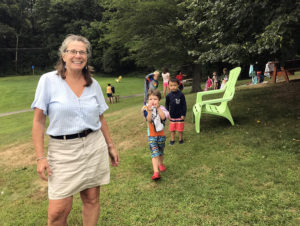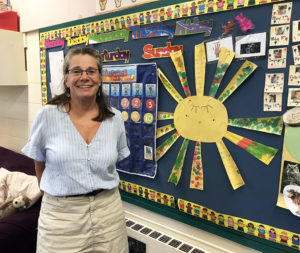By Alice Waugh
Gail Wild came for the music but stayed for the Moonbeams.
Today is the last day as the Moonbeam Room teacher at the Magic Garden Children’s Center for Wild, 65, who’s retiring after a Lincoln career that began as a music specialist. She’s been teaching preschool in various locations since 1975, with the last decade or so in the room populated mostly by three- and four-year-olds. Wherever she was, music has always been a centerpiece of her approach.
“Whether you’re a [classroom] teacher or a music teacher for young children, the most important ingredient is to make it fun,” Wild said. “The younger they are, the more like sponges they are. If something’s fun, they gravitate to it. And music is such a huge umbrella.” She’s introduced her young charges to everything from jazz, blues and opera as well as lullabies and rhyming songs.
Music is an important way to unify children and get them on the same page, at least for a little while. “If you spend time around young children, it can get very loud, with 10 to 20 realities going on simultaneously — everyone wants attention and wants to be heard,” she said. “When we sit for music, we become one voice,” using music to express feelings, or focus on the natural world or being kind.
As a high school student about to go to Tufts University in the early 1970s, “I didn’t have a clue what I wanted to do, but knew I didn’t want to wear nylons or sit in an office behind a desk,” Wild said. Her older sister had studied early childhood education at Connecticut College and that sounded interesting, so she enrolled in the Eliot-Pearson Department of Child Study and Human Development at Tufts. Since most of the students there were women who many assumed were looking for husbands, the running joke was that “pre-med was on the hill and pre-wed was in child development,” she laughed.
In Wild’s first preschool job in Arlington, about half her students did not speak English at home, so songs like “Twinkle, Twinkle Little Star” and the alphabet song were easily shared experiences for the whole group. “It’s the idea of having a common voice,” she said.
Wild is not disappearing altogether from Magic Garden — she’ll go back to being a part-time music specialist while also spending more time doing massage therapy (she earned her degree in that field in 1984).
“I love doing healing work with people — it’s a wonderful way to connect that’s the exact opposite of working with children. You deal with grownups, stay in one place and don’t talk, for the most part, but you’re still retaining that connection, just doing it with your hands rather than your voice,” she said.
It hardly needs saying that what Wild will miss most at Magic Garden is the people, and not just the children. In the summer, the school hires interns, and some of them are college students who are also Magic Garden “alumni,” she said. “That’s pretty sweet to have someone come back and say ‘I remember when I was in Moonbeam!’”
“I’ll miss the amazing co-teachers I get to spend my days with, and I’ll miss a lot of laughing” — and of course, her students, she added. “Pretty much on a daily basis, you walk in the door and you have some bright eyes ready to give you a hug and happy to see you. That’s a great benefit you don’t get in some other jobs.”
Just recently, Wild was reading aloud the classic book Corduroy and got to the part where the titular stuffed teddy bear goes upstairs in a department store to sleep on one of the beds in the furniture showroom. “And a kid says ‘But Gail, how can he go to bed there? There’s no toothbrush!’ I just love those moments that make you smile from ear to ear when you get into the world of a three-year-old,” she said.
Wild also looks askance at the increasing emphasis nationwide on education for younger and younger children. “Parents shouldn’t worry about academics at all at this age. It’s more about can your child play, do they have an imagination, can they socially interact with others?”
The most obvious change Wild has seen during her career has to do, not surprisingly, with technology, which has consumed not just children but the adults around them. “Kids have a lot more knowledge at their fingertips, and they’re probably more computer-savvy at three than I am now. It’s their second language. But I worry when I go to a restaurant and see parents checking out their phones rather than engaging eye to eye with their kids. A lot of them will grow up with that—not making eye contact when they’re talking to someone,” she said.
“What children want is [adults’] full attention, and I get that they don’t always have that attention to give when they’re running around trying to make dinner or something. But if your child is acting out or feels sad, you are the sun in their world, and they just want you shining on them—knowing that even if it’s just for 10 straight minutes, it’s about them.”


Leave a Reply